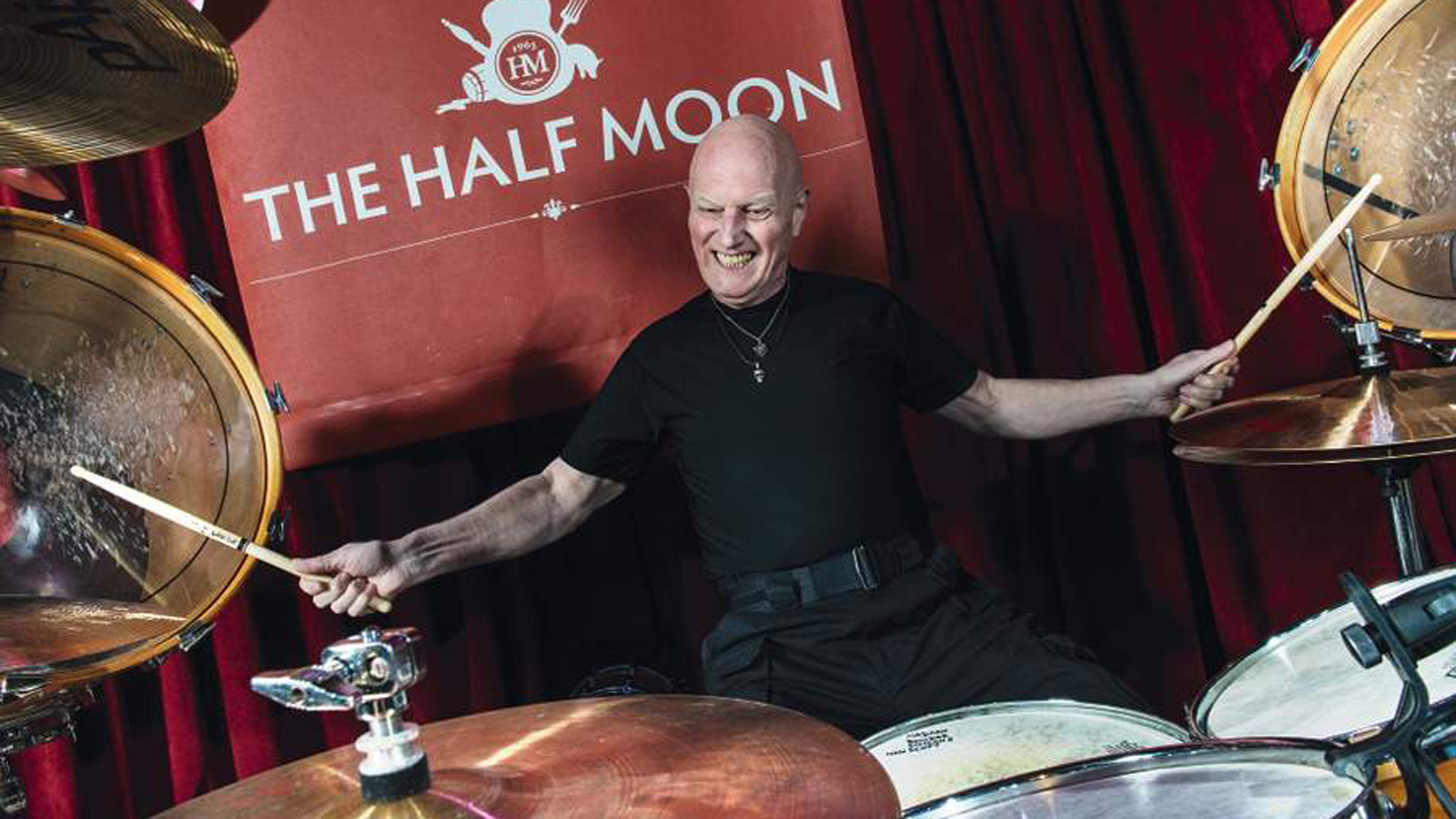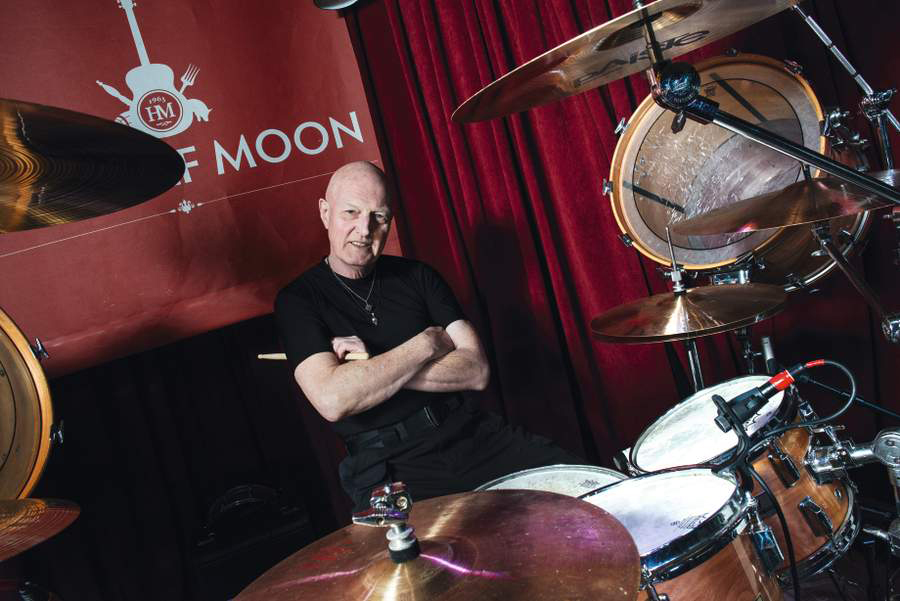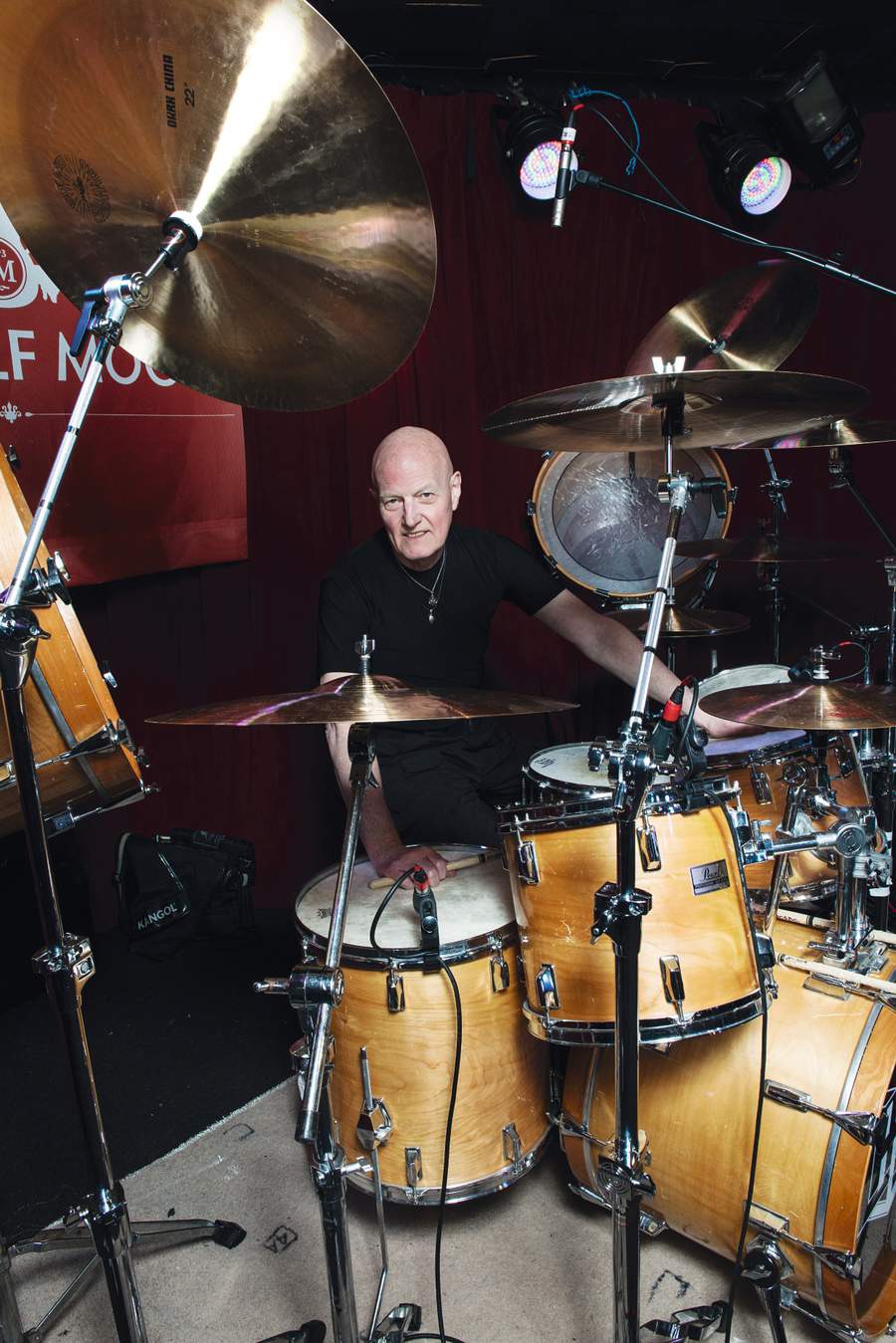
While Chris Slade may be known predominantly for his five-year stint with AC/DC, that is just the tip of a monstrously huge iceberg.
Since starting out with Tom Jones in the '60s, Slade has played with a who's-who of rock greats. Jimmy Page, Paul Rodgers, David Gilmour, Manfred Mann, Gary Moore and Gary Numan are just a selection of icons to have benefitted from Slade's raw power behind the kit.
When we met up with him, the drummer was out on the road with his new band - The Chris Slade Timeline. It's a project that sees Slade play tunes from throughout his 50-year career, and he's clearly having a ball while revisiting some of the many classic tracks tucked away in his back catalogue.
Your first gig was with Tom Jones, how did you first become aware of Tom?
"My father was a tap dancer, singer and entertainer and he worked with Tom. My father told me there was this great young singer and he was even better than Tommy Steele. I said, 'He can't be better than Tommy Steele or he'd be on the telly!' But my dad was right."
And how did the gig come about?
"A few years later when I was about 17 I had a Saturday job in a shop in Cardiff. Tommy Scott, as Tom was then known, and the Senators were a well-known Welsh act. A lady who worked with me in the shop told me they had sacked their drummer the night before. That day Mike Roberts the guitarist walked into the shop to buy some shoes. I went up to him shaking and said, 'I hear you're looking for a drummer. I'm a drummer and I live by Tom.' We got together and they asked if I could play 'Walk Don't Run' by The Ventures, I started playing it and they said, 'Let's go down the pub and rehearse then.' That was the start for me."
Want all the hottest music and gear news, reviews, deals, features and more, direct to your inbox? Sign up here.
Was the band making a good living at that point?
"We were playing five or six nights a week making good money and then we went to London and starved because we couldn't get any gigs. It was bad. We used to eat every other day because that's all we could afford. We went from big fish in a small pond to small fish in an ocean."
It wasn't long before success came, though.
"Tom had a tremendous voice. As soon as we recorded 'It's Not Unusual' we knew it was a Number One. Tom went to the manager who had written the song, Gordon Mills, and Tom said to him that if he couldn't have that song then he'd no longer be his manager. Gordon said, 'We've promised it to Sandy Shaw!' Tom was going to go back to Wales and pack it in without that song, but Sandy turned it down."
Tom went on to enjoy huge success from there on.
"We'd gone from starving in London to Tom being a Las Vegas entertainer. He was the biggest thing in the world. I'm not exaggerating to say that at one time in the States he was bigger than Elvis and Frank Sinatra put together. We played a week in Cherry Hill, New Jersey and it was jammed every night, all they had on the marquee was, 'He Is Here.'"
"We'd gone from starving in London to Tom being a Las Vegas entertainer. He was the biggest thing in the world"
That must have been a whirlwind time for you.
"It was a crazy time, as were all of the excesses that went with that. I was a guy in my early twenties. Enough said. It was a great time and a great learning curve. We went from a rock'n'roll band to a 30-piece orchestra."
You went from Tom to Manfred Mann.
"I left Tom in 1970. I left Tom and got a phone call from Manfred Mann. I'd played on a few tracks when we did Chapter Three, which was between Manfred Mann the pop group and Manfred Mann's Earth Band. It was jazz really. A month or so later he called me saying he was putting a band together and asked if I'd like to do it. He asked if I knew a bass player and I'd just started playing with Colin Pattenden and that became the basis of the first Earth Band."
Was that an easy transition, going from the pop and big band of Tom to jazz?
"I'm lucky that I can do that. If not then my career would have ended when Tom went to do big band. In fact, they had Kenny Clare waiting in the wings in case I screwed up while doing the big band stuff with Tom. No pressure there. I saw him and said, 'Kenny, what are you doing here?' It didn't even click with me. But they were waiting in case I screwed up and they'd say, 'Slade out, Kenny in.'"
"Gary Numan was great because I got to play with Pino Palladino. What a fantastic player and a great rhythm partner"
Gary Numan was another huge style shift and took you into the New Wave and electronica world.
"Gary Numan was great because I got to play with Pino Palladino. What a fantastic player and a great rhythm partner. Gary asked me if I knew any fretless bass players and I'd met Pino a few weeks before because he's from Cardiff, even though everyone thinks he's Italian. I knew he was talented, I didn't know how talented I just knew he was really good. He fitted perfectly and we did that for about a year. Gary's into the electronic things and Pino put a lot of soul into the music."
The electronic side of the gig must have been a challenge?
"The terrible thing was that we didn't even play to a click, we had to play to tracks, recorded keyboard tracks. That was difficult. You had to listen for the chord sequences. I remember one night the monitors went out completely, I couldn't hear any tracks. I said, 'Pino, I'm following you now!' Gary didn't like that very much, but there was nothing I could do."
What was Gary like to work with? He was a huge star at that time.
"Gary was demanding. It's funny, I've worked with two Garys, the other being Gary Moore who was also very demanding. Both very demanding but great. Gary Moore, what a player."
David Gilmour is another great player that you played with.
"Gilmour is fantastic, he's a real diamond. He was great to work with, and I say 'with' because with some people you work for them, but with Gilmour you worked with him, and that's a big difference. It was the same with Jimmy Page."
You played with Jimmy Page alongside Paul Rodgers and Tony Franklin, of course, in The Firm. How did that happen?
"I got a phone call one morning: 'Hello, it's David Gilmour here.' I said, 'C'mon Fred, stop messing about, I know it's you.' The voice on the other end said, 'No, it really is David Gilmour.'
"I looked at the phone incredulously. He was putting a band together and wanted me to play drums. I said, 'Wow, Let me think for a mi… Yes!' But I told him I was already involved with Mick Ralphs and his band and he said, 'Oh that's okay, Mick's doing this as well.'
"That was that, I said I'd be there. I said to my missus we were going to the pub. We came back a few hours later and the phone rang, 'Hello, this is Jimmy Page.' I said, 'Fred, I really know it's this you this time!' But it really was Jimmy Page and he said he was putting a band together with Paul Rodgers and they wanted me to play drums. I told him, 'Jim, you won't believe this but three hours ago David Gilmour asked me to do a tour and it's at least three months.'
"There was a dead silence and then he said, 'That's okay, we'llw ait for you.' I couldn't believe it. In the end Page and Rodgers waited for nine months for me. I'dc all from the States telling him they'd added another two months to the tour, I knew I was the luckiest man in the world there. I was the first permanent drummer Jimmy had used after John Bonham, I'm very proud of that."
There was an agreement from the start that The Firm would record two albums and then split. Did you wish the band had stayed together for longer?
"We were going to put it together again. There were talks between their people, our people, people and other people and it was going to be put back together and then this tiny, lesser-known band called Led Zeppelin got back together and did their reunion which knocked it on the head. Who knows what will happen, never say never, it might happen."
After The Firm came AC/DC. Another monster of rock for you to get your teeth into.
"I was working with Gary Moore and I think Malcolm Young came to a concert at the NEC. Bob Daisley knew Malcolm and that got me the chance to audition. I auditioned along with 100 top players. I know the names of some but I won't say. But people from top bands were phoning the guys saying, 'Don't tell my band but I really want to try out for AC/DC.'"
How did the audition go?
"I did the audition and thought I'd done terribly. I called my wife and told her I'd be home in half an hour and it had gone terribly, I said the wrong things, I played the wrong things. I was kicking my butt all the way home. She walked up the path when I got back and she said, 'So you did really badly then,' and I said yes and she said, 'They've just called to say you've got the gig!'"
That was a great time to be in the band, with the end of their mid-'80s slump and their return to headlining stadiums…
"It was fantastic. One thing about those live shows, people ask me if we used a click track with AC/DC, we never did. On stage, I didn't want to play to a click and I didn't want to hear a click. I wanted a light to flash the tempo beside me. I just wanted flash, flash, flash, flash and then I'd count the band in. I just used it for the starting tempo. Oh, and these people saying I was playing the songs too fast, I never set the tempos, it was Angus and Mal. Let's put that on record. They set those tempos, you can't arguewith them."
The Razors Edge album was a real rejuvenation for the band.
"I remember Cliff saying to me that they used to sell millions of each album worldwide and now they sold about one million worldwide. I thought, that'd do me. 'Thunderstruck' and Razors Edge must have sold 20 million. Back when I was in the band it was 10 million in America alone. It brought new life back to the band. 'Thunderstruck' was a great song, they wrote a great song there."

Where did the idea for that set-up with the two bass drums either side of your head come from?
"It came straight out of my brain. We had the 'dum, dum' at the start which were just dubbed toms. I was wondering how I could recreate it and make it visual for the video. I told Dick the drum tech that I wanted two bass drums up at shoulder height, he said, 'You what?!' I came in the next day and there they were. He'd built frames and things to make it work."
That must take some strength to play those kicks.
"I didn't hit them very often but I loved that. I treat drumming like martial arts, you focus your power. Martial arts taught me to breathe properly and focus your power in one second and that's how I play drums. I treat drums like I would treat a weapon."
Is that kit still your go-to kit?
"That kit is a Pearl kit, but I actually now use DW. I'm using the Pearl kit for this tour because it was a good fit, but otherwise I use DW. The work that they do is staggering, I thought a drum was a drum until I used DW. I use pretty much the same set-up and sizes as the Pearl kit that I used at Donington, but it's a DW kit with a DW Edge snare, that snare sounds fantastic."
The 1990 Monsters of Rock at Donington has gone down as a truly iconic show…
"That was great. We'd been doing the big shows, the Monsters of Rock with Mötley Crüe, Metallica, Black Crowes and people like that to 100,000 people. We happened to film this one and David Mallett was the director. He loves drums, that was great for me because usually you get three seconds of the drummer and then that's it. It's, 'Oh there's the dru… oh, he's gone.' We all know about that. He did a great job for the whole band. It was Number One three times all over the world, on video, DVD and Blu-Ray. I'm very proud of it."
You also had Arnold Schwarzenegger appear in one of your videos. Was that one of the more surreal experiences of being in AC/DC?
"Yes, we did the 'Big Gun' video. He's a very funny guy, actually. He was even funnier when he picks Angus up and puts him on his shoulder while wearing the schoolboy suit."
It sounds like you had a great time with AC/DC, but you'd left by 1995's Ballbreaker. Why's that?
"I'd been doing demos with the guys in London for two months. Mal called me and said it was nothing to do with me and was nothing I was doing or not doing but they wanted to give Phil [Rudd] a try. I said, 'That's me out then, I'm gone.' Mal said, 'No, no, no we want to keep you on, we don't even know if Phil can play,' and told him that was his problem now. If it ain't broke, don't fix it. I resigned the next day. They wanted to keep me on for months and months and that didn't feel right. It was probably my stupid pride. If that was my son I would now say, 'No, just sit there, they'll come back to you.' To be honest, I think they would have [laughs]! But they're very proud themselves and they wouldn't come back now.
"We still get on and it was an honour and a privilege to play with those guys. People always ask me what I did when things went wrong on stage with AC/DC. Nothing ever went wrong. I might drop a drum stick, maybe, but that was about the only thing. They were like clockwork, like a machine. Just fantastic. What a wonderful experience."
What's the secret to getting all of these big gigs?
"It's a combination of your people skills and your drumming skills. You've got to get on with people. If you're an a**ehole you won't get work after the first tour. Look at Jimmy Page, he's a very humble guy, he doesn't walk around thinking he's Jimmy Page, he's just a nice guy."
You've now got the Chris Slade Timeline?
"I've always wanted to do this but I've never had the musicians to do it. I've never had musicians that could do AC/DC and then play some of the other stuff, it is a huge spectrum across 50 years of my life and career. With these guys here, they're all friends of mine from Kent where I'm based and without them this project wouldn't have got together.
"We've just recorded an EP, songs like 'July Morning' and 'Thunderstruck' and then two Earth Band songs, 'Joy Bringer' and 'Blinded By The Light'. That kicked Bruce Springsteen off. We've got two singers, one that does AC/DC stuff and one that does the more, shall we say, melodic material. It's a project I've wanted to do for some time, maybe not for 50 years. But certainly for 10 years I've wanted to put this together."
You're now 67 years old, is the end of your drumming career coming into sight?
"It's a great honour to be able to play, especially at my age. If I was unable to play with power then I would stop. It's got to feel like I've run a marathon every night. I couldn't sit in the corner ticking away playing jazz."
